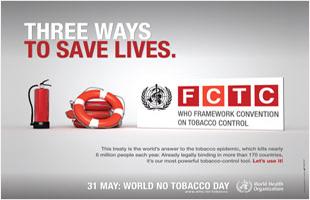 Poster for World No Tobacco Day 2012Tobacco use is the most common risk factor for noncommunicable diseases. It is the only product in the world that kills half of its users. Almost 6 million people die from direct and second-hand smoke each year. By 2020, this number will increase to 7.5 million, accounting for 10% of all deaths. However, if current trends continue, tobacco will kill nearly 8 million people every year throughout the period leading to 2030. Smoking is estimated to cause 71% of lung cancer, 42% of chronic respiratory disease, and nearly 10% of cardiovascular diseases. The highest incidence of smoking among men is in low- and middle-income countries.
Poster for World No Tobacco Day 2012Tobacco use is the most common risk factor for noncommunicable diseases. It is the only product in the world that kills half of its users. Almost 6 million people die from direct and second-hand smoke each year. By 2020, this number will increase to 7.5 million, accounting for 10% of all deaths. However, if current trends continue, tobacco will kill nearly 8 million people every year throughout the period leading to 2030. Smoking is estimated to cause 71% of lung cancer, 42% of chronic respiratory disease, and nearly 10% of cardiovascular diseases. The highest incidence of smoking among men is in low- and middle-income countries.
In Afghanistan data on smoking and its effects on health are limited. However, the Global Youth Tobacco Survey of 2010 indicates that more than 16% of youths have ever tried or experimented smoking, 90 % of them tried a cigarette at the age of 13 years, 17% of children have been affected by passive smoking, 21 % of students said that most of their closest friends smoke cigarettes, 18% of students think that passive smoking is not harmful.
In addition, a recent study conducted in Kabul indicated that “the prevalence of cigarette smoking among men aged 15 years and older is estimated to be 35.2%. Study findings show that 46% of respondents were smoking at some point in their life. In total, 85.4% (35.2% current smokers and 50.2% passive smokers) of respondents were somehow exposed to cigarettes smoke”. Study findings indicate that those who grew up in a family where family members were smoking, are more likely to smoke compared to those respondents whose family members were not smoking.
The Government of Afghanistan has signed and ratified the WHO Framework Convention on Tobacco Control. In addition the Ministry of Public Health has drafted legislation on tobacco control, which is under review in the Ministry of Justice before its final approval by Cabinet and the Parliament.
Related link
Tobacco Free Initiative regional programme








